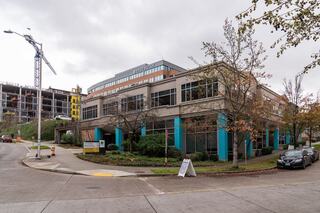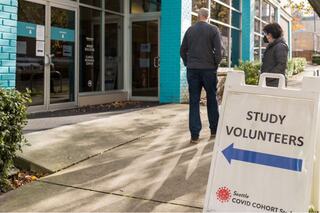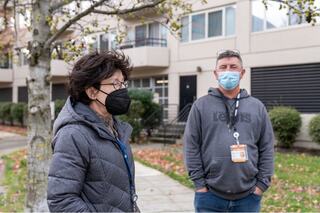Constructing a Clinic to Combat COVID-19

Nestled in the heart of Fred Hutchinson Cancer Research Center’s South Lake Union campus—amongst life-saving cancer research—is the Hutch’s COVID-19 Clinical Research Center (CCRC). The 10,000-square-foot clinic, located in the Minor building, is on the hunt for effective treatment and prevention medications for COVID-19, the disease caused by the SARS-CoV-2 virus.
At the CCRC, researchers are incorporating a diverse population of study participants in novel intervention and therapeutic trials. The trials will help deliver treatments and prevent outbreaks at a local and international level for this disease, which has killed more than 800,000 people in the U.S., and over 5,000,000 people globally, so far. One of the potential treatments researched at the CCRC includes laboratory-manufactured proteins, which act like human antibodies in the immune system – also known as monoclonal antibodies. These antibodies have been emergency-use authorized for use in hospitals to treat COVID-19 infection and are now being researched for use as COVID-19 infection prevention for individuals who are immunocompromised.
The CCRC at the Minor Building is hard to miss; the bright teal columns stand out against the red brick campus—notifying study participants they are in the right place. The clinic has private parking and a dedicated elevator and pathways to bring participants from the parking garage directly to the specifically designed second-floor clinic, which features 11 private clinic rooms and a modified mechanical system to filter airflow and create negative pressure between the COVID-19 clinic space and adjacent clean area—meaning Fred Hutch staff and patients are fully protected from risk of exposure. Click here to take a virtual tour of the building.
Nestled in the heart of Fred Hutchinson Cancer Research Center’s South Lake Union campus—amongst life-saving cancer research—is the Hutch’s COVID-19 Clinical Research Center (CCRC). The 10,000-square-foot clinic, located in the Minor building, is on the hunt for effective treatment and prevention medications for COVID-19, the disease caused by the SARS-CoV-2 virus.
At the CCRC, researchers are incorporating a diverse population of study participants in novel intervention and therapeutic trials. The trials will help deliver treatments and prevent outbreaks at a local and international level for this disease, which has killed more than 800,000 people in the U.S., and over 5,000,000 people globally, so far. One of the potential treatments researched at the CCRC includes laboratory-manufactured proteins, which act like human antibodies in the immune system – also known as monoclonal antibodies. These antibodies have been emergency-use authorized for use in hospitals to treat COVID-19 infection and are now being researched for use as COVID-19 infection prevention for individuals who are immunocompromised.
The CCRC at the Minor Building is hard to miss; the bright teal columns stand out against the red brick campus—notifying study participants they are in the right place. The clinic has private parking and a dedicated elevator and pathways to bring participants from the parking garage directly to the specifically designed second-floor clinic, which features 11 private clinic rooms and a modified mechanical system to filter airflow and create negative pressure between the COVID-19 clinic space and adjacent clean area—meaning Fred Hutch staff and patients are fully protected from risk of exposure. Click here to take a virtual tour of the building.

Until the renovation began in May of 2020, the Minor Building served many purposes, primarily office space for several Fred Hutch user groups. It was the ideal location for COVID-19 treatment trials because it is safely separated from patients receiving life-saving treatments at the Seattle Cancer Care Alliance clinic and other research occurring around the 15-acre campus.
The pandemic sparked a need for research to begin within a fast-paced timeline. Lewis’ team at the Fred Hutch campus was tasked with transforming the building into a fully functional and safe space for volunteers to participate in clinical trials in just a few short months. Work included remediation, extensive MEP upgrades and installation of handwashing sinks and HEPA filters in each room.
“Everyone on the project was eager to be a part of making a difference,” said Lewis Project Manager Jacki Dunlap. “The whole world was in chaos when we were building this project and our project team got to be a part of the solution.”

Project Manager Jacki Dunlap and Assistant Superintendent Shaun Anstice discuss their experience building the COVID clinic on the Fred Hutch campus in Seattle.
The renovation began in May of 2020, just four months into the pandemic, at a time when public understanding of COVID-19 was still unclear. The most challenging part was maintaining COVID protocols while our work completed and volunteers began participating in research within the space.
The Lewis team was eager to take on this challenge and help people around the world receive life-saving treatment for COVID. Superintendent Shane Weller recalls the pride he felt leading the team, “our crews knew the work they were doing was actively helping our community fight back—we were on the cutting edge of COVID-19!”
If Fred Hutch researchers can help develop better treatments that keep COVID-19-positive patients out of the hospital and develop prevention methods that limit the spread within communities, it would be another key tool to ending the pandemic.
“I think everyone on our team knows someone who has or has had cancer, which makes working on the Fred Hutch and SCCA campus really hit home. Working on this project was different,” said Lewis Assistant Superintendent Shaun Anstice, “this was an immediate need that impacted tons of people, so you could really feel the change in energy on our team.”
Since the clinic opened in October of 2020, more than 270 volunteers have participated in the clinical trials conducted by the center, enabling researchers at Fred Hutch to take us one step closer to beating COVID-19!